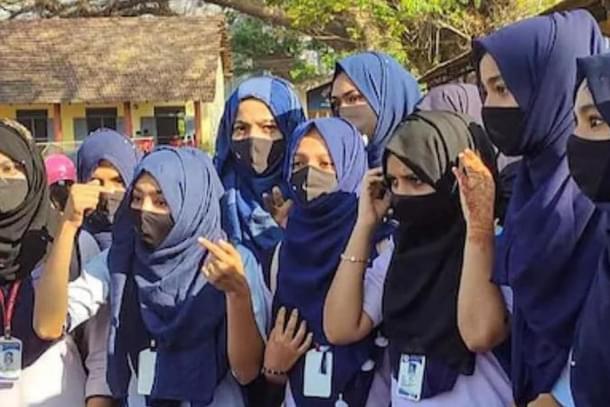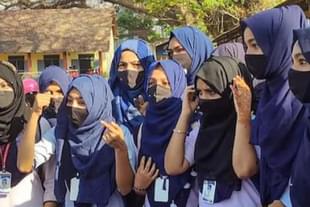News Brief
Karnataka: 'If Bangles, Crucifix, Turbans Are Allowed, Why Not The Hijab?', Argues Petitioner For Students In HC
Swarajya Staff
Feb 17, 2022, 02:09 PM | Updated 02:09 PM IST
Save & read from anywhere!
Bookmark stories for easy access on any device or the Swarajya app.


”If people wearing a turban can be in the army, why can't a person wearing her religious symbol be allowed to attend classes? This is a draconian measure,” remarked advocate Ravivarma Kumar as he concluded his arguement on behalf of the petitioners in the Hijab row case that is being heard by the Karnataka High Court.
Among other arguements which sought that the MLA have no administrative powers as it would be a death low to doctrine of separation of power, Kumar also submitted that the College Development Committeee was constituted only for academic standards and do not have the authority to prescribe uniforms.
He added that shutting Muslim girls out of classrooms for sporting the headscarf will spell doomsday for their education, asking the court to take judicious note of the fact that the are least represented in classrooms.
As the counsel referred to a research paper with a survey on religious symbols and personal appearances, he said while majority of Muslim men wear skull cap, among women 89 per cent of Muslims, 86 per cent of Sikhs and 59 per cent of Hindus wear headcovers. When the court questioned the authenticity of the research paper, Kumar responded saying he was only bringing the ‘diversity present in the country’ to the notice of the court and asked then is the government ‘picking only on Hijab’.
“Hindus have their religious symbols, Sikhs have it, Christian have it…why is only Hijab being targeted? Bangles are worn. Why only pick on these poor Muslim girls?” questioned Kumar.
Chief Justice Ritu Raj Awasthi reiterated that the rule ‘prohibits headdress to everyone, not only to one particular religion’ in response to Kumar’s reference to the prohibition of discrimination on the grounds of religion under Article 15.
To which Kumar responded saying “Hijab is worn only by Muslims. Goonghat is permitted, bangles are permitted, Why not ban on crucifix of Christians. Why not turban of Sikhs?”
He was followed by Sr Adv Yusurp Muchhala who also tried drawing hypothetical parallels and asked what if a girl wears glasses and is asked to wear glass of a particular colour alone and prohibited from wearing any other, saying such things can’t be ’taken so rigidly’.
To which Chief Justice Awasthi asked the counsel if anyheaddress has been prescribed as part of the uniform. Muchchala replied saying it was not. But he went onto ask if “Suppose there is mandate not to wear chappal. And if some girls wears chappal, will they say don’t come into my class?”. He went onto argue that the question of whether a religious practice is ESR is relevant under Article 26(b) when it talks of denominational rights and not when petitioners are making claim under Article 25(1).
The court adjourned the hearing for 2.30 pm on Thursday.
On Tuesday, the petitioners had argued that wearing the hijab is an innocent practice of faith and not a mere display of religious jingoism. Interestingly, before the court resumed hearing the case on Tuesday, the petitioners had filed a new petition which said that since elections are due in some states, the matter is intentionally being given a political color and that is why Muslim girl students are also being harassed.
‘Sarvajanik suvyavasthe’ means “public order”, argues Kamat.
Senior Advocate Devdutt Kamat, the counsel appearing for Muslim girls of Udupi college, further clarified on the interpretation of the GO in Kannada language, as many questions were asked regarding whether the words used in the GO exactly meant “public order” or not.
On Monday, the Advocate General had pointed out that the word does not mean “public order” and the petitioner has mistranslated it. Kamat said every provision for ‘public order’ in the Kannada translation of the Constitution uses the same word (sarvajanik suvyavasthe) as is used in the GO. Kamat further used this to assert that the state government is seeking to invoke “public order” ground in the GO.
While Justice Dixit questioned Kamat about Justice Hidayatullah’s judgment in the Sajjan Singh case in which he said that “I don’t want to play a grammarian”, Kamat, referring to the Sardar Syedna Tahir case, said that in this the Supreme Court (SC) had struck down the Bombay Act, which had banned ex-communication from one community on a petition by the Bohra community members. In this case, the SC maintained that if it is an essential practice, then it should be upheld.
On this, the HC said that we are interpreting the order given by the government, and not the official conditions. In response, Kamat said that the words used in the GO cannot have two meanings, and it only means “public order”.
International precedents from secular countries
In support of his case, Kamat cited the ‘KwaZulu-Natal and Others v Pillay’, pertaining to the right of a Hindu girl from South India to wear a nose ring, said that the South African court, in this case, has said that there are other students who are afraid to express their religion or culture, they will be encouraged to do so.
It is something to celebrate and not be afraid of. Kamat said the SA court, in its ruling, said that the public display of religion and culture is a celebration of the diversity that enriches our schools.
Kamat further said that the case for hijab is not about the constitutionality of the school uniform, but about whether a certain exemption, accommodation, can be made for students exercising religious faith, to wear an extra cloth of the same color.
He also mentioned another South African judgment allowing Rastrafarians to keep dreadlocked hair in school and a Canadian judgment allowing a Sikh student to wear Kirpan in school.
Our secularism is “positive secularism”
Referring to the interim order passed by the High Court last week, Senior advocate Kamat said that our constitution follows “positive secularism” and is not like Turkey’s “negative secularism”. He said that our secularism ensures the protection of religious rights of all people.
"This is an innocuous practice of wearing a headscarf and not changing my uniform. This is a facet of freedom of speech and expression. If a small exemption is given to wear a headscarf, it will be in line with the right to freedom of speech and expression,” he added.





